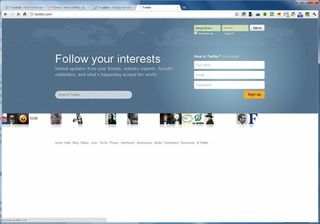24 hours back on 56k dial-up: what's it like?
How I got on going back to a modem
Then Dropbox kicked in and tried to upload the screengrabs and text I had already written for this feature. It's slow enough when you try and do that on mobile broadband, but this was excruciating. It was apparently happening at 686kbps, but Dropbox was obviously lying to me. I was actually achieving speeds of around 25-30kbps using my modem.
Skype logged in without issues, though it didn't connect a video call when I tried it – somewhat understandably – and you'd struggle to even make a Skype voice call on dial-up. Windows Live Messenger didn't even bother to log in automatically.
So I went through the usual services I check every morning. First Twitter – I started TweetDeck. The columns looked to be refreshing for absolutely ages and took over a minute to appear. At the same time (more fool me) I tried to load Facebook – which didn't load at all. TweetDeck then loaded a solitary tweet while still attempting to refresh the other two columns.

FREEZE: TweetDeck was more like a lame duck on dial-up
Giving up, I decided to look at Twitter on the web. Unfortunately the website didn't even work properly. Loading Twitter.com was staggeringly slow and it didn't even to bother log me in automatically as it does usually. Either this is some security thing as I'm using a different connection on this PC, or I'm pretty second class as a dial-up user.

WHO: Twitter refused to remember me on my second-class connection
I left Twitter open and decided to do some work. I often use Google Docs but this time decided to work offline. When I tried to access an – admittedly large – spreadsheet in Google Docs, loading was very slow. But I wasn't surprised – if there's a web app dial-up wasn't designed for, it's Google Docs.
Get daily insight, inspiration and deals in your inbox
Get the hottest deals available in your inbox plus news, reviews, opinion, analysis and more from the TechRadar team.
However, it's not all doom and gloom; Gmail wasn't too bad and loaded fine on the simple HTML view for slow connections.
One of the main problems I had with dial-up while trying to do work is that I use Google all the time to look up various stats and other information. I was surprised that Google searches took an age to appear – Google Instant didn't work, while non-text search results like the images and videos didn't really appear! I was surprised that Google doesn't seem to adapt for slower connections as I thought it might – aside from the lack of Google Instant the page looked identical.
The most painful thing was that at various points it seemed like I was slowing to a total crawl, so I had to disconnect and reconnect.
After hours, I looked at Facebook. The service works OK on dial-up – but only if you're patient. It loads pretty sluggishly and the Top News column expands constantly as you start to browse it, because new elements are still loading.
The norm for some
It's no wonder we all used to rely so much on magazine cover CDs for programs to install; downloads are obviously super slow on dial-up and can take many, many hours. Something as bloated as Apple's iTunes takes around 8-10 hours to drip through your connection.
But there are some sites that work extremely well on dial-up – the BBC text-only or mobile sites have all the same great information and the plethora of sites specially adapted for the iPad, such as http://touch.facebook.com, are great examples of sites that are great on a dial-up connection.
So, by the end of my day, I'd actually got rather used to being on a slow connection. That's not to say I really enjoyed it of course – at times it was extremely difficult. It's just that I was able to adjust what I was doing. Instead of listening to stuff on Spotify or Last.fm I just used iTunes. Instead of looking at Facebook several times a day I just looked at it once. And downloading files? I didn't bother doing that at all.
But, of course, this was a single day for me. A lot of people have no choice. The Government's 2009 Digital Britain report said that "Up to 10 per cent of homes are still in not-spots, not-a-lot spots or not-at-all good spots" for broadband. A sobering thought for those of us so used to fast access.
Dan (Twitter, Google+) is TechRadar's Former Deputy Editor and is now in charge at our sister site T3.com. Covering all things computing, internet and mobile he's a seasoned regular at major tech shows such as CES, IFA and Mobile World Congress. Dan has also been a tech expert for many outlets including BBC Radio 4, 5Live and the World Service, The Sun and ITV News.
